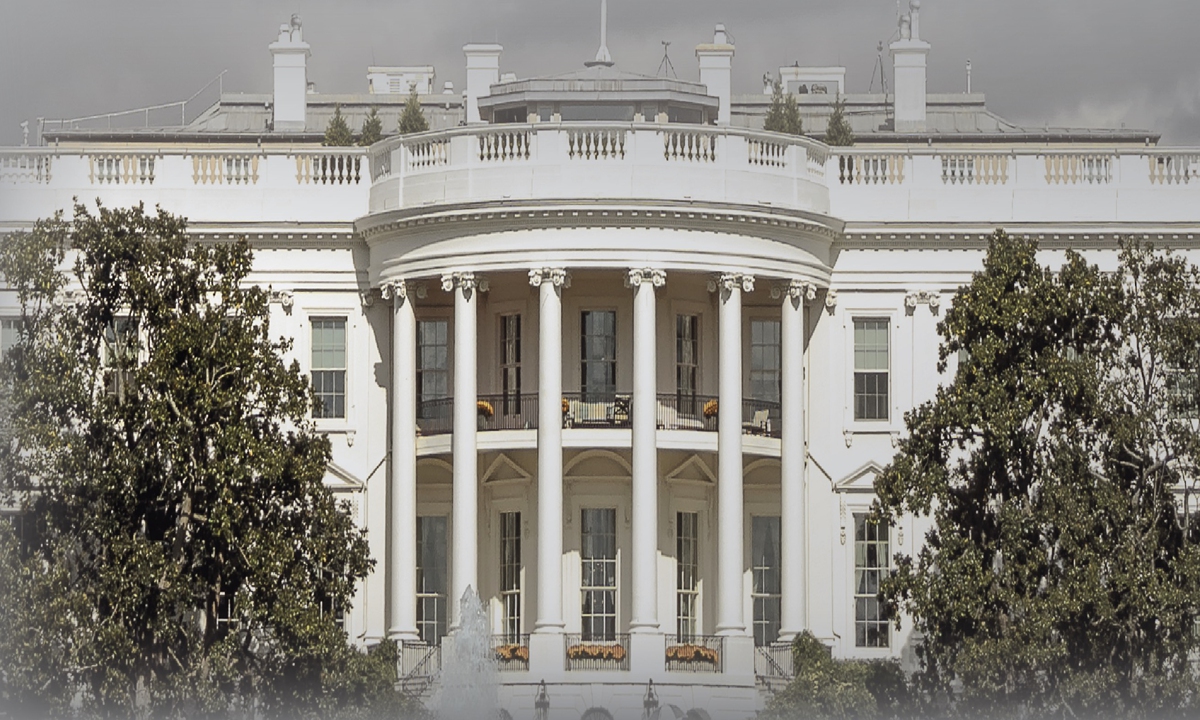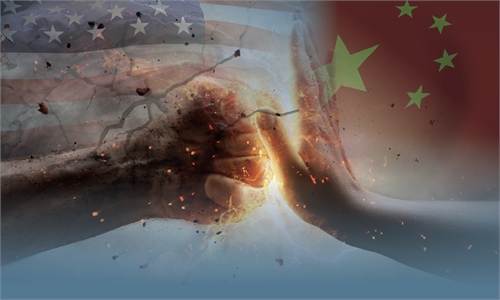OPINION / GLOBAL MINDS
US' unrelenting insistence on global preeminence has deeply distorted key global realities

Photos: VCG
Editor's Note:
On June 6, the Global Times (GT) published an interview with the renowned US scholar Noam Chomsky, in which he calls the US' current policies toward China "outrageous." This view was echoed by James Peck (Peck), a US scholar and Adjunct Professor of History at New York University. "In the midst of an increasingly multipolar world, and given China's economic dynamism and size, Washington finds the world has become a far more fluid and less controllable place," he said in a recent interview with GT reporter Xia Wenxin, in which he shares his opinions on China-US relations and multipolarity among other topics.
GT: You wrote us in an email in June that you were "delighted to see" our recent interview with Noam Chomsky. Could you please elaborate on why you felt so?
Peck: We [Chomsky and I] have known each other for over 50 years, and I've long urged such communication and such an interview in China. For over a half-century Chomsky has been one of America's most perceptive and well-known intellectual critics of US policies and its responsibilities for so many global injustices. Today, as US leaders, and much of Europe, demonize China as a frightening, threatening force, his views again offer a stark contrast and warning to prevailing US policies and the interests they serve. As Chomsky's GT interview reveals, China is central to how he sees humanity's evolving possibilities and his message, particularly for Americans and Europeans to change their views on China, is a very stark and urgent one. Let me underline a few of his critical insights that I share.
First, the US and China are going to have to find ways to reach an accommodation with each other to cope not just with the decades-long nuclear perils that continue, but a climate crisis that is rapidly and in often unexpected ways getting worse by the year. This crisis is likely to evolve in dramatic, surprising ways, becoming interwoven with other crises that demand unprecedented forms of global governance. This is not a crisis for Chomsky that can be managed amidst Washington's current geopolitical strategizing centered on maintaining its global preeminence with its zero-sum games and ever-greater strategies to treat China as the new enemy.
He argues quite the opposite. Scientific and technological cooperation at all levels, not decoupling or "de-risking," are imperative; explorations of technologies in depth are needed to cope with the looming crisis, ways found of encouraging, not discouraging, further advances in China's solar and green energy areas. Indeed, a spirit of cooperation to develop all sorts of innovative technology essential for our survival needs to be undertaken with wide-ranging openness to unexpected breakthroughs. All this requires a dynamic and innovative Chinese economy, not US policies to restrict or undermine its development.
This is hardly a commonly heard argument today - that [working with] an economically developing China is in the end in the interest of the US. But Chomsky's point is that all this needs to take place amidst meaningful global governance approaches that must deal with the all too likely consequences of global warming, including possible massive migrations, desperate conditions in poor nations and economic crises. Understanding and dealing with future pandemics, of course, is also part of this.
Second, and central to Chomsky's analysis, are the ways in which unrelenting US insistence on its global preeminence has deeply distorted key global realities and China's place in them. Indeed, what most perturbs Washington is China's independence and the ways it has found to develop, ways for which there was no preexisting model. For Chomsky, China's development, economic size, and independence is a China that the US cannot bend to its wills like Europe and Japan. This exposes the real "China threat."
In the midst of an increasingly multipolar world, and given China's economic dynamism and size, Washington finds the world has become a far more fluid and less controllable place. China is an enormous factor in this, but not the cause. As Chomsky says, the US would much rather focus on China and mobilize against a new enemy than develop strategies more attuned both to today's emerging power realities - and existential threats.
GT: While looking back at your experience over the past year, you told me in another email that "if possible, the passage of time has only further made evident the dangers of US policies." What made you come to this conclusion? What kind of US policies do you find most dangerous?
Peck: The invasion by Russia of Ukraine has reinforced longstanding US efforts to sustain and reinforce its global preeminence. Since the Marshall Plan and the creation of NATO in the late 1940s, the US in various evolving contexts has employed a combination of global strategic and military means, and economic corporate and financial power, to further its American-centric globalizing policies. That is not to say that state-based global strategy and corporate interests always fit together. They do not. But often subtly, they do interact as in Europe today. With the war in Ukraine, Washington is seeking not simply to consolidate its strategic authority and influence via an expanding NATO, but to ensure that Europe's economic development does not pose unacceptable challenges to the US. We see, to cite just one example, how immediately Germany confronts a potent challenge to its economic well-being in being cut off from Russian natural resources and the US calls for decoupling, de-risking from China.
The relentless pursuit by Washington of the war in Ukraine reflects the resurgence in the full force of policies that have underlaid American centrality for over seven decades. The most recent NATO statement further underscores the determined reassertion of Washington's longstanding use of NATO and the use of militarizing means, with implicit and escalating overtones in recent months about extending a military-economic dynamic into the heart of Asia to confront China.
GT: China and a large part of the international community feel concerned that the US is always "saying one thing and doing another." Are you also concerned by this?
Peck: Washington has long been an expert in saying one thing and doing another. There are many aspects to this but let me just note one. I have long been struck by what I call the cynicism of the true believers among Washington's leading strategists. They really believe in American preeminence and that a single country, meaning only the US, can coordinate and run the planet. If they must undertake actions and policies that they know in many cases are contradictory to what they say, it is all for a higher purpose. Former US senator J. William Fulbright used to say Washington was not always particularly good at propagandizing others, but it was incredibly good at propagandizing itself. And nowhere did Fulbright find this more evident than in the belief that Washington and the US simply out of its own history could understand the world, that its values were universal, and that it had the wisdom to orchestrate globally what needed to be done. To Fulbright, this was the essence of the American Arrogance of Power - and it led to endless obvious conflicts between what the US was doing in the world and what it was saying it was doing. It's indeed an old story.
GT: Halfway through 2023, we have seen many exciting international events conducive to building a multipolar world, such as the reconciliation between Saudi Arabia and Iran, French President Emmanuel Macron's call for Europe's strategic autonomy, and the developing countries' growing interest in BRICS. Are you confident that the world is moving toward multipolarity? Could the US be an obstacle to this?
Peck: I barely have any doubts that the world is moving in a more multipolar and multicultural direction. Geopolitically and economically, BRICS, the vast majority of nations in the South, President Macron among some European leaders, see a rather different world than what Washington wants. But I expect Washington (and some Europeans) in a host of diverse ways will struggle against its realization. Central to the problem is Washington's insistence on seeing the multipolar world through the prism of an emerging China rather than China developing in the context of this multipolar and multicultural world. Doing so, allows Washington to make China the focal point of its policies, a mobilizing enemy so useful again, as in the past. China's remarkable economic transformation and its independence within a multipolar world is the real challenge to US preeminence. This is not then a question of China's rising per se, it's part and parcel of a global shift in power within which China indeed plays a fundamental and critical dynamic role, one which the US needs to learn to work with, as many nations in the South ardently wish. Recent developments in the Middle East and China's diplomatic role there further serve to underline this ongoing global transformation.
But we should have few illusions about the kind of response this is getting in Washington and how Washington's increasing inability to cope with its problems of governance is feeding into this. Nor should we underestimate the degree to which military-industrial interests are being served by making China "the enemy" or the often-contradictory ways in which energy and corporate interests have mobilized to ensure their own pursuit of profits.
GT: Ten years ago, the Chinese leader introduced the idea of "a global community of shared future." How do you evaluate its contribution to the world over the past decade?
Peck: A global community of shared future in the end is really the only way to go. China's emphasis on the United Nations-based global framework as opposed to Washington's much beloved rules-based order is indeed central to this. At the same time, all sorts of interconnected and unexpected crises are likely to push countries to grapple with means of global governance in a language that China has advocated. But we are only at the beginning of what needs to be done. How do we find a way to deal fairly with climate issues? How do we deal with the continued imposition of intellectual property rights on climate technology in poorer countries? How do we deal with Americans being far worse carbon polluters than the average Chinese person and that the US and Europe are responsible for the bulk of historic emissions? Global governance is going to have to deal with issues where there is a historic injustice involved in asking others to show more restraint than the US and the Europeans have done. And then there are all the questions of what assistance is urgently required for the less well-off countries.
A global community with a shared future, in the end, requires this sensitivity to the distinctive cultures of the multitude of nations emerging amidst an increasingly multipolar, multi-cultural world. But unfortunately, this is not how Washington's strategists approach the world today. In universalizing US power, they universalize their keywords and conceptions of power and see others driven by the same power imperatives so notable in Washington today - except of course, Washington idealizes its motivations and the role it plays in the world it insists it must lead.
GT: How is the writing of your new book, Misunderstanding China, going? Have the dynamics of China-US relations in the past year impacted the process?
Peck: I have almost finished the book, but regrettably recent developments such as Ukraine underline the more dangerous and disturbing components of American policy. Again, NATO's recent statement only reaffirms these tendencies. And all this I think must consider what is taking place within the US where the means of governance is increasingly imperiled, and China has been significantly inserted into the middle of national security, congressional, media and academic discussions about the US role in the world. It has been a lot to sort out.

